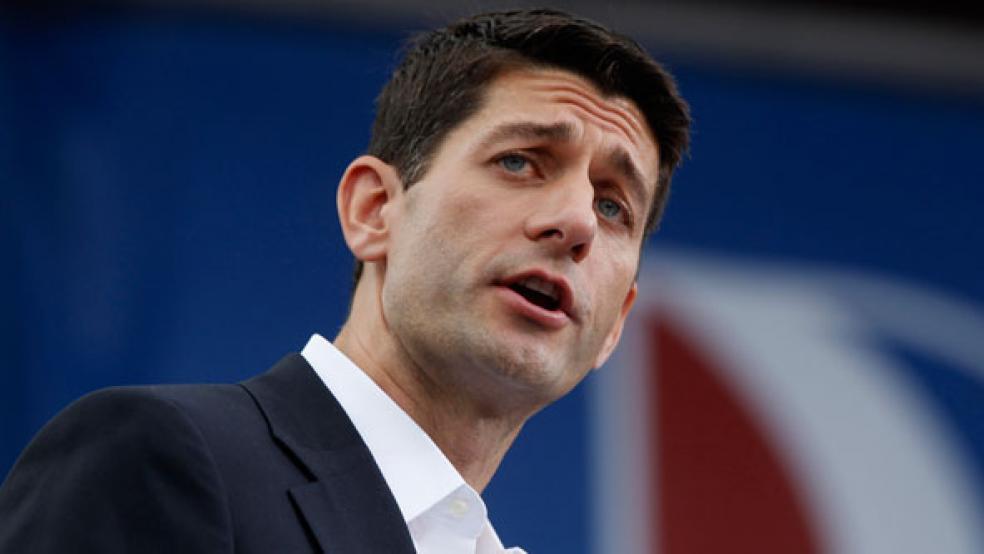Stung by President Obama’s pummeling of the Romney-Ryan GOP presidential ticket last November, Rep. Paul Ryan (R-WI) had appeared to fade from view.
“He seems to have fallen entirely off the radar of early state Republicans,” Politico reported last March. “What the heck has happened to Paul Ryan?”
Now, however, Ryan is in the red hot political circle – and very much a part of the speculation about the 2016 GOP presidential campaign. Ryan was in Iowa this past weekend to bask in the adulation of the Republican base and to blast Obamacare as an example of big government run amok.
Related: Paul Ryan: 10 Things You Didn’t Know About Him
A June Gallup survey found that Ryan was rated most positively by Republicans and GOP-leaning independents among five potential presidential candidates, with a 69 percent favorable rating. He was followed by Sens. Marco Rubio of Florida, Rand Paul of Kentucky, Ted Cruz of Texas and New Jersey’s Gov. Chris Christie.
In a keynote address at a Saturday night birthday celebration for Republican Gov. Terry Branstad, Ryan said that a big problem he and Mitt Romney faced during the campaign was “arguing against big government in theory.”
Now, he said, people are seeing “big government in practice” under Obama – and they don’t like it. “The next time you have a famous politician coming through Iowa … talking about big government, let’s be a bit more skeptical,” he added.
Ryan hasn’t decided whether to run for president in 2016, but he told The Des Moines Register last week he’ll give the race “a hard look” after next year’s mid-term elections. Even so, he has begun to stress the need for his party to broaden its appeal beyond the GOP base of mostly white males if the party hopes to retake the White House.
Ryan, meanwhile, still commands the spotlight in Washington as co-chair of the bipartisan Senate House Budget Conference Committee responsible for coming up with a spending plan by Dec. 13 to avert another government shutdown in early January.
Related: Obamacare Individual Mandate May Be Next to Fall
Ryan and Senate Budget Committee Chairwoman Patty Murray (D-WA) have vowed to find “common ground” to bridge the huge differences between House Republicans and Senate Democrats on budget and tax policy and in eliminating part or all of sequestration.
Yet Ryan has been combative for much of the year, encouraging House Tea Party conservatives to hang tough against Obamacare. He voted against a Senate-brokered bipartisan compromise to end the 16-day government shutdown in November.
While being taken seriously by the political pros as a potential presidential candidate, he is also taking a back seat to Chris Christie, who scored a reelection victory last month that highlighted his appeal to a broad segment of the electorate, including Hispanic voters. He also lacks the appeal of Cruz and Paul among Tea Party conservatives who will heavily influence the outcome of next year’s primaries.
Veteran pollster John Zogby described Ryan as “someone who is very smart who understands that his party is fractured . . . and that there just aren’t enough white conservatives to sustain a winning candidacy.”
Zogby also believes Ryan gained little if any political advantage by running on Romney’s ticket. He said on Tuesday that Ryan “has to be looking over his shoulder at Chris Christie, who can actually run on the mantle of having an alternative governance model – not an alternative governance ideal only.”
Related: Meet the Players of the 2014 Fiscal Finals
Ryan, 43, came to power as head of the House Budget Committee after years as a legislative aide and speechwriter, think tank analyst, marketing consultant and junior House member from the small town of Janesville, Wisc.
After the Republicans won control of the House in 2010, he unveiled the groundbreaking “Roadmap for America’s Future” – a budget plan designed to slash government spending and restructure many social programs and entitlements. He called for privatizing Medicare and converting Medicaid to a block grant and turning it over to the states.
Early last year, before he joined Romney’s ticket, Ryan unveiled his latest budget plan that borrowed heavily from his three previous endeavors. “Balancing the budget is not simply an act of arithmetic, it’s not just getting expenditures and revenues to add up,” Ryan told reporters. “[It] is a means to an end; it’s a means to a healthier economy, a pro-growth society, a pro-growth economy that delivers opportunity.”
Ryan benefitted from his reputation as a fire-breathing budget balancer and small government enthusiast. After Romney ruled out Christie as a running mate, he turned to Ryan, according to Double Down, the new book by Mark Halperin and John Heilemann.
“Mitt meditated on the choice that now seemed inevitable: Ryan,” the authors write. “Beyond all the political pros and cons, Romney felt comfortable with Paul. He reminded Mitt of junior partners he used to work with at Bain [Capital]: eager, earnest, solicitous, smart and not at all threatening.”
The election loss in 2012 was a huge turning point for Ryan, according to The Washington Post. Ryan has since seemed ready to move forward “to embark on an ambitious new project: Steering Republicans away from the angry, nativist inclinations of the Tea Party movement and toward the more inclusive visions of his mentor, the late Jack Kemp.”
Since February, Ryan has quietly been in inner-city neighborhoods with another former Kemp ally, Bob Woodson, a 76-year-old civil rights activist and anti-poverty crusader, to talk to ex-convicts and recovering addicts about the means of their salvation.
“Go into inner cities, go into minority communities,” Ryan told The Des Moines Register recently. “Go into communities that have not seen or heard from Republicans in a long time.”
Top Stories from The Fiscal Times:
* The Real Problem of the Failed Obamacare Rollout
* House GOP Slams the Door on Immigration Reform
* The Poll That Could Make Democrats Give Up Obamacare





